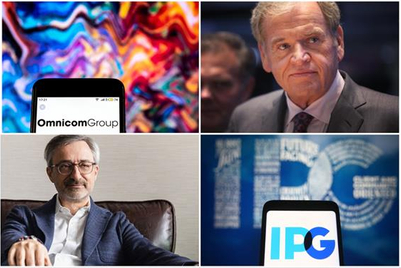
Marketers are concerned that their brand identities will be diluted as artificial intelligence (AI) technology takes over more aspects of the advertising creation process.
Image editing tools that can churn out dozens of assets from one piece of creative, such as those recently launched by Google and Meta, spit out results that promise to lift performance – but often look homogenous to other brands in their category.
Agency holding company Interpublic Group (IPG) has joined nonprofit coalition Partnership on AI (PAI), which is working to establish responsible AI standards, to campaign for AI to not only be strictly audited but also designed for human co-creation.
“The most important thing is understanding that AI is really a copilot for human creativity,” says Kate MacNevin, global chief operating officer of McCann Worldgroup. “We have to make sure that we still have the human touch, the human lens, to make sure that the work we're putting out into the world stays true to our brands’ tone to how brands want to show up in the world.”
IPG and its creative network McCann Worldgroup represent the first marketing and advertising services companies to join PAI, which has signed on more than 100 academic, nonprofit and tech organisations to promote responsible practices in the development of AI.
PAI was founded in 2016 by Amazon, Facebook (now Meta), Google, IBM and Microsoft and has since signed up other major tech firms including Apple and OpenAI.
It is one of several cross-industry initiatives aiming to establish standards for AI to mitigate the technology’s potential harms.
Omnicom Group became the first advertising holding company to join the Content Authenticity Initiative (CAI) in May, a consortium of businesses working to develop an open industry standard for labeling content that has been altered by AI. Publicis Groupe similarly became the first advertising network to the Coalition for Content Provenance and Authenticity (C2PA) in June focused on developing a standard for media provenance.
Microsoft is one of IPG’s largest clients, which “bubbled [the PAI] to the top” of the network’s priority list, MacNevin said. She added that the PAI aligns with IPG’s broader commitment to champion responsible business practices.
MacNevin did not rule out IPG joining other initiatives. “[We will] constantly revisit the partnerships and the platforms that we're engaging with,” she said.
IPG has established an AI Steering Committee involving agency leaders from across the world tasked with disseminating key learnings from PAI throughout the network.
One solution it is already working on is developing AI prompts that use inclusive language to encourage less biased responses.
Growing excitement and alarm
The industry has quickly embraced the latest wave of generative AI technology and the opportunities it opens up to produce faster, more efficient work.
WPP struck a partnership with Nvidia in May to build an AI-powered content engine that it claims will produce immersive, tailored and more efficient content for clients.
At the Cannes Lions festival last month, Omnicom unveiled a generative AI-powered virtual assistant called Omni Assist designed to improve agency productivity, and Havas launched an AI-powered global production offering called Prose on Pixels to create personalised content at scale.
But AI’s power and potential comes with risks. Several AI experts who helped build the foundations of the technology have warned that it could lead to ethical and existential crises if left unbridled.
More than 300 AI scientists, professors and tech leaders signed a statement published by the U.S.-based nonprofit the Center for AI Safety in May that warns that AI could lead to the extinction of humanity. Signatories include the CEOs of OpenAI and Google DeepMind as well as Microsoft CTO Kevin Scott.
While it may be possible to stave off extinction, AI is forecast to replace a portion of the human workforce within the next few years. Research and advisory firm Forrester last month predicted that 32,000 jobs within the U.S. agency workforce will be replaced by AI by 2030 — representing 7.5% of the industry’s total employee base.
While the report raised alarm bells, MacNevin believes the advertising workforce will change “in a good way.”
“This [AI] will actually open up new opportunities within our industry for different kinds of talent and different kinds of people, and that's really exciting, because that's to me at the core of creativity: different perspectives, different ideas,” she said.


.jpg&h=334&w=500&q=100&v=20250320&c=1)
.jpg&h=334&w=500&q=100&v=20250320&c=1)
.jpg&h=334&w=500&q=100&v=20250320&c=1)




.png&h=334&w=500&q=100&v=20250320&c=1)





.jpg&h=268&w=401&q=100&v=20250320&c=1)


.png&h=268&w=401&q=100&v=20250320&c=1)
